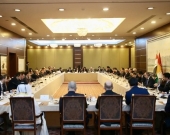Report says NSA snooped on Islamists’ porn habits

The eavesdropping agency focused on how propagandists for the violent extremists could be undermined with evidence of hypocrisy, citing surveillance on six individuals as examples, according to the quoted NSA document.
“A previous SIGINT (signals intelligence) assessment report on radicalization indicated that radicalizers appear to be particularly vulnerable in the area of authority when their private and public behaviors are not consistent,” said the document.
“Some of the vulnerabilities, if exposed, would likely call into question the radicalizer’s devotion to the jihadist cause, leading to the degradation or loss of his authority.”
A potentially damaging piece of evidence would show a militant “viewing sexually explicit material online or using sexually explicit persuasive language when communicating with inexperienced young girls,” it said.
The leaked document is the latest in a cascade of revelations from Snowden revealing the NSA’s large-scale digital spying, which has provoked a global firestorm.
The six individuals targeted for NSA surveillance were seen as radical Muslims giving inflammatory speeches, but were not described in the document as linked to terror plots, the report said.
The Huffington Post withheld their identities and locations.
All six live outside the United States, though one was described as a “U.S. person,” meaning he is either a citizen or has permanent resident status.
Through electronic spying, the agency had found sexually explicit information about at least two of the people targeted, some of which was gleaned through FBI surveillance, according to The Huffington Post.
One of those targeted was described as a “respected academic” who has promoted the idea that “offensive jihad is justified.”
The spy service concluded that he is potentially vulnerable because of his alleged “online promiscuity” and that he publishes “articles without checking facts,” according to the report.
The document did not indicate whether the NSA carried out the idea to discredit the men by leaking the information or otherwise.
U.S. intelligence agencies did not deny the report or question the validity of the document.
“Without discussing specific individuals, it should not be surprising that the US government uses all of the lawful tools at our disposal to impede the efforts of valid terrorist targets who seek to harm the nation and radicalize others to violence,” said Shawn Turner, spokesman for the director of national intelligence.
The methods discussed are reminiscent of tactics used by the FBI, the NSA and other agencies in decades past to tarnish civil rights leaders, including Martin Luther King, anti-war activists and labor organizers.
When an inquiry by lawmakers in the 1970s exposed the domestic surveillance, Congress adopted new limits on spying powers and created a foreign surveillance court that is supposed to review requests for eavesdropping on communications between a foreign suspect and a U.S. resident.
“This report is an unwelcome reminder of what it means to give an intelligence agency unfettered access to individuals’ most sensitive information,” said American Civil Liberties Union deputy legal director Jameel Jaffer.
“One ordinarily associates these kinds of tactics with the secret police services of authoritarian governments.
“That these tactics have been adopted by the world’s leading democracy -- and the world’s most powerful intelligence agency -- is truly chilling,” he added.
Al Arabiya












